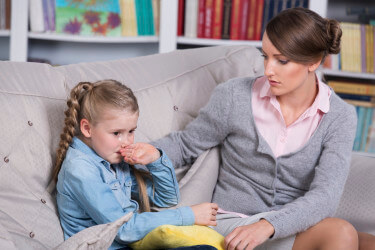 As a parent, it can be difficult to know how to react when your child is anxious or has anxiety. Today, we’ll discuss how to communicate with your child, what tools to use to help them manage their anxiety, as well as the importance of anxiety education.
As a parent, it can be difficult to know how to react when your child is anxious or has anxiety. Today, we’ll discuss how to communicate with your child, what tools to use to help them manage their anxiety, as well as the importance of anxiety education.
- Be consistent
Nothing makes kids anxious quite like inconsistent rules and parenting. Work on being as fair as you can when parenting multiple children, and hold yourself accountable when you make a mistake. If you coach yourself in the same way you coach your kids, they’ll notice it, they’ll appreciate your honesty, and they’ll emulate your behavior.
Watch out for being too lenient, as well. If you don’t have any rules, it can cause anxiety. Kids crave guidance and boundaries, and they’re looking to you for that. If you deliver, they can enjoy being kids and not worry about having to parent themselves.
- Communicate
Remember being young? You were a lot smarter than adults gave you credit for. Your kids are the same way, especially when it comes to spotting conflict.
Conflict—be it in the home or away from it—can cause anxiety. Much of it stems from fear of the unknown; we tend to be more anxious about what we don’t know than what we do.
So keep them involved, even when it comes to the heavy stuff. Especially when it comes to the heavy stuff. Don’t make them wonder “Why is Mom angry?” or “Why is Dad acting so weird?”
Keep the lines of communication open and don’t worry about sugarcoating things. Being honest with your kids about what’s going on will make them feel included, respected, and ultimately, more at ease.
- Learn and grow
To effectively talk to your kids about their anxiety, it’s essential to become educated about what exactly anxiety is and how it manifests. Unless you’ve been anxious yourself, it’s easy to default to a “Buck up and calm down.” message of tough love. This may feel right to you, but it makes the problem even worse than it was before.
If a client of ours struggles with anxiety, we like to have their parents read a book of their choosing on the topic. It’s a great way to put yourself in your kids’ shoes. A great book we’d recommend picking up would be The Everything Parent’s Guide to Children with Anxiety by Christina Siegel and llyne Sandas.
Kids who have an anxiety disorder can’t be talked out of it. Instead, ask them what’s going on, then do nothing but listen and validate. Be curious about what they’re going through and use statements and questions like:
- I’m so sorry. That must be really hard.
- Can you tell me more about that?
- What are some of the things you dream about?
- Is there anything I can do to help?
- What are your biggest fears?
- Use the tools professionals use
We have a few methods to share with you.
The worry box: Have your kids write down their worries on strips of paper, fold them and put them in the box. Rather than dwelling on a worry, they get up, express it and put it in a confined space where it can’t jump back into their brain. It symbolically says “It’s okay to let this go. You can worry about it tomorrow.” Particularly effective before bedtime.
Worry time: “Every night at 7, we’re going to worry for 15 minutes.” Sound weird to you? We totally get it—clinicians are a little goofy—but this method just plain works. Let’s say your daughter has her anxiety triggered at school. She can recognize the trigger and tell herself “You know what? I’m worried about this. I’ll bring it up at 7 and go about my day.”
Therapy, medication or a combination of the two: Anxiety is very much tied to brain chemistry, and rewiring that magical organ is not easy. Managing anxiety happens to be one of the many things in which we specialize at Stenzel Clinical.
If you’re near Chicago’s west suburbs, Stenzel Clinical has offices in Wheaton, Naperville and Geneva. Our board certified, licensed staff is passionate about helping people. Talk to us today.
Above all, remember that there is hope. Anxiety may seem impossible to conquer now, but over time, you’ll find it’s completely treatable.

